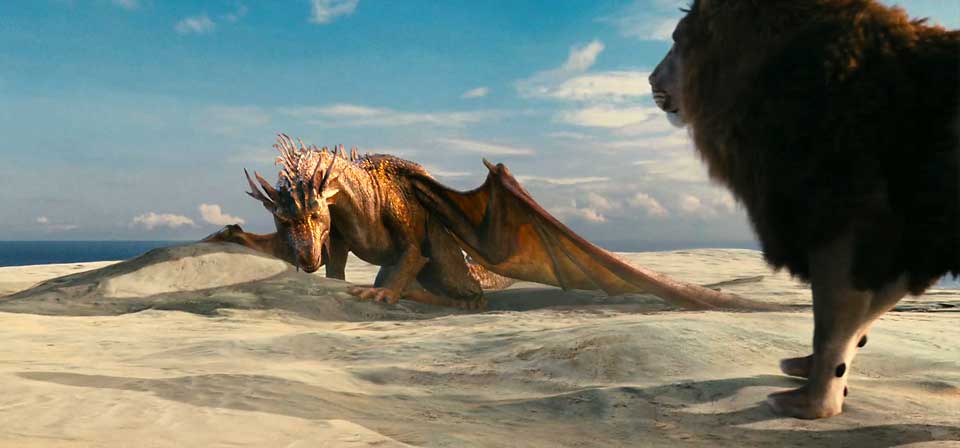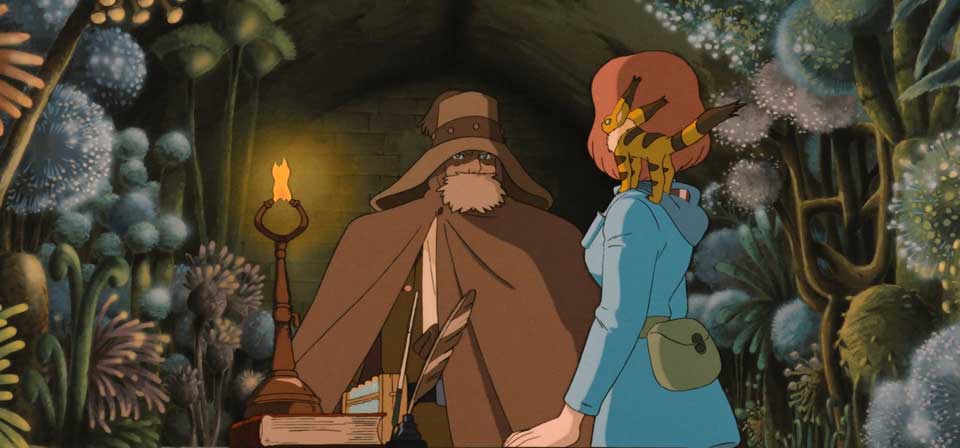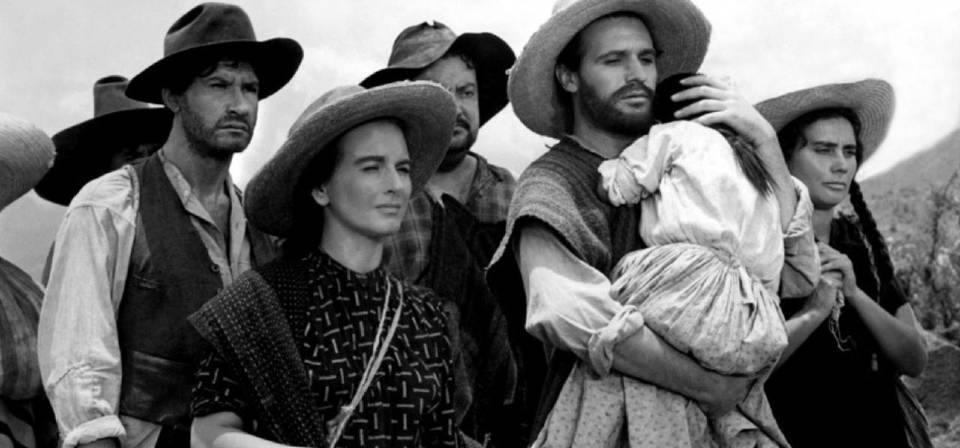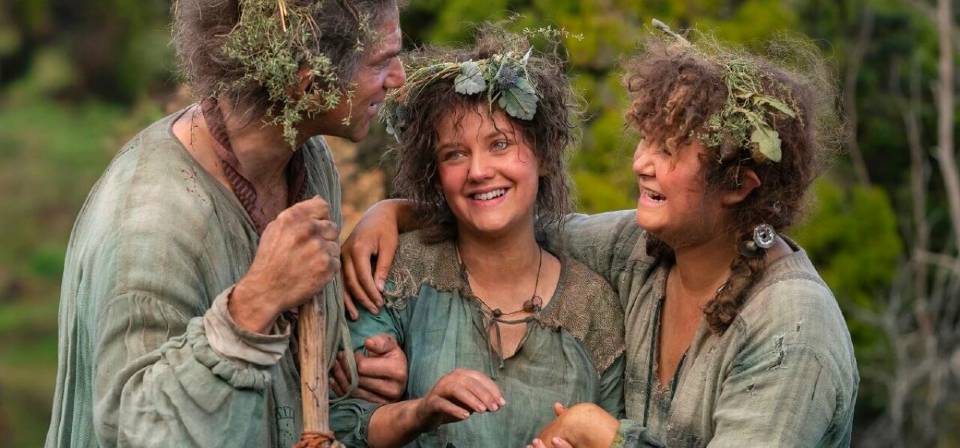Search Results
61 records found
The Namesake (2007)
At the end of its 122 minutes, perhaps, few if any of the story’s various partial threads have really been resolved. Open-ended and somewhat scattered, The Namesake is generally engaging but feels elusively incomplete. One could say it is about the journey rather than the destination. A more disciplined approach to the screenplay might have distilled Lahiri’s 300-page novel into something more satisfyingly focused. Instead, frequent Nair collaborator Sooni Taraporevala chooses to sketch in and gesture at as much of the book as possible, trusting viewers to supply the rest.
Nanny McPhee (2005)
Mary Poppins meets Lemony Snicket in Nanny McPhee, adapted by star Emma Thompson from Christianna Brands’s Nurse Matilda stories about a magical nanny who knows just the medicine for a family of exceedingly naughty children, and doesn’t bother about the spoonful of sugar to help it go down.
Nanny McPhee Returns (2010)
The second time is the charm with Nanny McPhee Returns, a sequel that improves on the original 2005 Nanny McPhee by more than a nose — even if it’s the bulbous nose of Nanny McPhee herself.
Napoléon (1927)
It is an extraordinary artifact from another culture, a mythology as remarkable and as alien as the Epic of Gilgamesh or the Icelandic Eddas. For students of silent film, this is one of those indispensable landmarks you must see before you die.
Napoleon Dynamite (2004)
As deadpan as its affectless protagonist, breakout indie phenomenon Napoleon Dynamite is like a Roschach test of viewer empathy.
Narc (2002)
(Written by Robert Jackson) Narc is trying to be something. Really hard. It’s obvious. The question is: What is it trying to be?
Narnia Filmmakers Hype the Fantasy, Hedge the Faith
A lot of thought and effort went into getting the feel, the look, the period and the characters of C. S. Lewis’s beloved fairy tale The Lion, the Witch and the Wardrobe right for the screen… At the same time, judging from the unanimous testimony of the filmmakers, one crucial element of the book was not a consideration one way or the other in adapting the story: its religious significance.

Narnian spirit: C. S. Lewis’ religious themes in the books, the films — and any films to come
With a new Blu-ray edition of The Voyage of the Dawn Treader available March 3, here’s a look back at the series so far … and a look ahead.
National Geographic: Inside the Vatican (2002)
Though the documentary plays like a “a day in the life” at the Vatican, National Geographic filmmakers actually spent three months in Rome amassing footage and interviews. The result is a well-rounded portrait, or series of portraits, of Vatican life: Vignettes include the ordination of a bishop, the restoration of a priceless tapestry, the swearing-in of a Swiss Guard soldier, reception of world leaders, and a race to digitally preserve disintegrating documents.
National Security (2003)
Martin Lawrence rants endlessly against the White Man and Steve Zahn tries to endure him in the obnoxious odd-couple action-comedy National Security (Columbia), directed by Dennis Dugan.
National Treasure (2004)
Nicolas Cage stars as heir to a family of treasure hunters seeking the riches of King Solomon’s temple, discovered by the Crusaders and hidden by the Knights Templar and the Freemasons, who planted clues on the back of the Declaration of Independence.
The Nativity Story (2006)
From It’s a Wonderful Life to A Christmas Carol, from Miracle on 34th Street to Tim Allen’s Santa Clause films, there are more Christmas movies than you could watch in all twelve days. Yet even at the height of Hollywood biblical epics, the real meaning of Christmas was essentially ignored (a few brief scenes in Ben-Hur notwithstanding). The Nativity Story goes a long way toward redressing this historic omission.
The Nativity Story and Catholic Teaching
In blogs, discussion boards, and other fora, a range of criticisms and objections concerning The Nativity Story have been raised by concerned Catholics. Some of these critiques are thoughtful and worthy of consideration, and raise issues regarding the film that have merit, or are at least defensible. Other complaints are more problematic, resting on misrepresentations of the film or even of Catholic teaching.

Nausicaä of the Valley of the Wind (1984)
(Reviewed by Sarah E. Greydanus) Nausicaä of the Valley of the Wind may be the quintessential Hayao Miyazaki film — not necessarily his best, but the most comprehensive assortment of his characteristic themes and motifs.
The Navigator (1924)
Buster Keaton’s most popular vehicle in his own day, and said to be Keaton’s favorite of his own films, The Navigator isn’t as sophisticated and satisfying as his best work (e.g., The General), but it’s still brilliant slapstick comedy, with a rousing third act and a slam-bang climax.

Nazarín (1959)
Buñuel makes his case against faith, not by attacking its foolish or corrupt practitioners, but by arguing that the thing itself, even when lived almost to perfection by a near saint, is moot, even harmful. It may be the most breathtaking cinematic cross-examination of faith I have ever seen.
New Blu-rays from Warner Bros
What does this year’s Best Picture front-runner Argo have in common with Grand Hotel (1932) and Driving Miss Daisy (1989), both recently released on Blu-ray?

A new foray into Middle-Earth: The Rings of Power
A Game of Thrones–ification of Tolkien? More Hobbit trilogy excess? Though not without missteps, Amazon’s ambitious Lord of the Rings prequel series gets off to a fairly promising start.
New Ghibli Blu-rays! My Neighbor Totoro and Howl’s Moving Castle
This week, one of Hayao Miyazaki’s most beloved and accomplished features, along with one of his less successful efforts, debut on Blu-ray.
New Moon: The Twilight Saga Returns
There is even a Twilight tourism industry, centered on Washington State, where much of the story is set. While Robert Langdon fans get to go to Rome and Paris for the Dan Brown experience, Stephenie Meyer aficionados converge on rainy Forks, Washington to take “Twilighter tours” of locations more or less corresponding to settings in the books, from a Craftman-style house similar to the Swans’ to a locker at Forks High School designated Bella’s locker.
Recent
- Benoit Blanc goes to church: Mysteries and faith in Wake Up Dead Man
- Are there too many Jesus movies?
- Antidote to the digital revolution: Carlo Acutis: Roadmap to Reality
- “Not I, But God”: Interview with Carlo Acutis: Roadmap to Reality director Tim Moriarty
- Gunn’s Superman is silly and sincere, and that’s good. It could be smarter.
Home Video
Copyright © 2000– Steven D. Greydanus. All rights reserved.